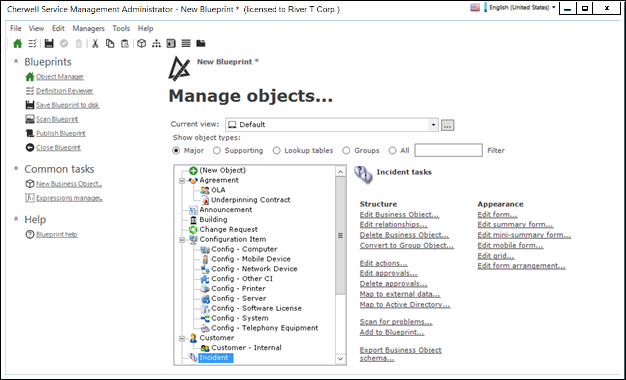Blueprint Editor
The Blueprint Editor is the built-in interface within CSM Administrator that allows you to manage System Objects, Business Object data, Items, Blueprints, and Blueprint tools/functionality.
When you create and work with Blueprints, the CSM Administrator interface changes to the Blueprint Editor.

Use the Blueprint Editor to:
- Manage System Objects: Create, edit, and delete Business Objects, Fields, Forms, and Grids. System Objects are managed using the Blueprint's powerful Object Manager and Object Editors, which are accessed from the Blueprint Editor main window.
- Manage Business Object Data: Create, edit, and delete data from Supporting Objects and Lookup Objects using the Data Editor.
- Access the Definition Reviewer: Quickly review and modify Forms, Grids, and Form Arrangements for all Business Objects or for those elements that have changed in the current Blueprint.
- Manage CSM Items: Create, edit, and delete Dashboards, Search Groups, etc. at a system level to keep them secure. CSM Items are managed using the various CSM Item Managers.
- Access the following Blueprint
tools/functionality (click
Tools from the Blueprint Editor menu bar):
- Configure Directory Services integrations: Configure the integration between CSM and various Directory Services (example: Active Directory, LDAP, etc.).
- Export a Blueprint Schema: A Blueprint Schema is a collection of meta-data that is exported from your system as a single document (.html, .rtf, .txt, or .xml) to textually expose your Business Object definitions and database structure.
- View the Blueprint Publish Log: A Blueprint Publish Log contains detailed information about Blueprints published to your system.
- Define global database settings: Global database settings include timeout values, foreign keys, Transaction Log settings, and Form/Grid display settings.
- Manage Blueprints: Save, scan, publish, and close Blueprints using the tasks in the Task Pane.